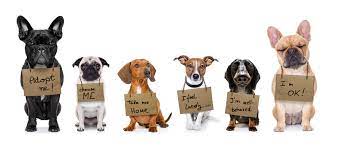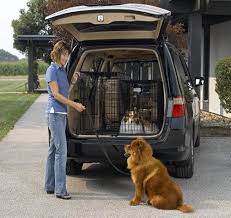 There really isn’t anything more exciting than bringing home a dog of your own. Of course, all of the usual family things such as having kids is exciting but a dog adds a little something extra to a family that wants to offer more love. A dog is not an impulse purchase and has to be considered to be a member of the family so it’s important for us to point out if you’re not ready for that kind of commitment, it’s best you don’t go and get one. A newly adopted dog – especially a rescue – will be craving your love and attention and that means you have a lot of learning to do before you bring your new pooch home.
There really isn’t anything more exciting than bringing home a dog of your own. Of course, all of the usual family things such as having kids is exciting but a dog adds a little something extra to a family that wants to offer more love. A dog is not an impulse purchase and has to be considered to be a member of the family so it’s important for us to point out if you’re not ready for that kind of commitment, it’s best you don’t go and get one. A newly adopted dog – especially a rescue – will be craving your love and attention and that means you have a lot of learning to do before you bring your new pooch home.
New dog owners are in a position where they can make life as easy as possible for themselves by getting as much information in as possible before they go looking at dogs to bring home. That’s what this article is for! From reading through websites like https://www.nextritionpet.com/blogs/nutrition/can-dogs-eat-oatmeal to learn about what dogs can and should eat, to learning how to cope during their puppy phase, you have a lot to learn before you get your dog home. Let’s dive into the things that you need to know before you adopt a new dog.
- Never bring a dog home without a background check. Are you getting a puppy? Do you already have a pet at home? What about kids? You need to know if the new dog you are bringing home is going to settle into an environment where they can be calm and happy and the only way to do that is to ensure that you look into their life before you. Your new dog will have had an entire life before you came along and you weren’t a part of that. It’s okay – that’s the whole point of learning about their history. Don’t forget to learn about medical history and temperament, and spend some time with them before you bring them home. You need to know about previous owners and medical history, medicines and more.
- Put together a file. When you do take your dog from the rescue, put together a targeted folder so that you can have them handy when you need it. This should include medications and vaccinations, trips to the vet, health issues and more. Having all of this handy will help you to keep track of your new dog and how they will behave in future. If you keep this in a file, you can share it with the vet or anyone else who needs to spend time with your dog, and you can then pass it on when you need to.
- Speaking of the vet. You need a vet if you’re going to have a dog. You also need pet insurance and you should think about speaking to local dog owners to learn which are the best vets to speak to for the breed you’re bringing home. Booking in a check up with the vet as early as possible is important because you need to have your dog checked over for any issues. Look for a place that has certified technicians and is properly licensed. The reviews should be good, too, as you want to know that your dog is in the best possible hands.
- Go supply shopping. Before you pick your new pup up to take them home, you are going to need supplies. You need a bed, bowls, leashes, toys and more and it should all be catered for the breed and activity level of your new dog. The good news is that there are both people and pet shops out there that are more than willing to sell you what you’re looking for.

- Make sure that you have a crate handy. While you won’t leave your dog in a crate all day long, having one is smart. If you have kids at home, you need somewhere for the dog to retreat to when they need some space. A good metal or soft crate acts as a den for your dog, giving them some much needed quiet time. It can be used for training and preventing behavioral issues, but it should never be used as a way to lock up the dog. Crates are great for travel, too, whether you are heading on vacation or you are heading to the vet, it can allow you to give your dog a little private space to calm down. If you use the crate effectively, they won’t be afraid of it. It should be big enough for them to stand in and move around in, too.
- Get them ready for the seasons. You can actually get your new dog ready for any seasonal changes that may occur. Did you know that there are plenty of things that your dog needs to be ready for when it comes to the change in seasons? From the weather to their nutritional requirements, you need to look out for what changes matter for your particular dog. Consider allergies, weather and more.
- Find a good groomer. It doesn’t matter what type of coat your dog has; they will need to be groomed! You will need toothbrushes for your dog and you need to get them using it where possible, too. Plaque sprays, dental equipment, combs and more will need to be a part of your kit for your new pet pooch. You want to ask your veterinarian for help here, though, as you might need a little guidance when it comes to brushing your dog’s teeth for the first time.
- Start considering their diet. Dogs do not have to eat the food that you buy from the pet store. Plenty of dogs do really well with a raw food diet but either way, their diet should fit their breed, size and their level of activity. It isn’t always easy to find high quality food but if you speak to the people you rescue your dog from, you should be able to figure out their likes and dislikes. If they have a diet with full grains, it may not be very healthy. You want to make sure that their diet isn’t too packed with carbohydrates, so you need to do your research by the breed.
- Get to know the laws. There are laws in certain areas when it comes to dogs and it’s up to you to research these before you go ahead and adopt. You want to ensure that you understand where you can and cannot take your dog, on and off a leash. You don’t want to end up with a fine because you brought your dog to the wrong place. Always get a new dog microchipped and registered, too, so that if they get out and go missing they can be found again.
- Never assume they are house trained. When you adopt a dog, you might forget that you have to potty train them! Dogs can become stressed in a new environment, and it’s always a good idea to assume that they don’t know the rules of toileting. Be prepared to take them to a training class or two so that they can get to know how to behave.

- Keep your expectations in line. If you are new to dog ownership, you need to spend time learning about their behaviors and discipline. Talk together about the rules for the dog, how to deal with poor behavior and how to reward positive behavior. You don’t want to fill your dog up with treats, but equally you need to know how to let your dog know you’re happy.
- Set a regular, specific routine. Dogs thrive on understanding the next steps in their day, which means that you need a specific routine for your dog to be comfortable. Dogs need exercise and activity and if you are living in a hot place, you know that you have to do their walks early in the morning and late in the evening to avoid burning their little feet. Your new dog will settle into the house with you if you put a routine for feeding and walks in place early. You should also ensure that they have everything ready for them in place before you bring them home for good.
- Ask for help. As a new dog owner, you might not know everything there is to know about your new dog and that’s ok! In fact, that’s expected. You should view learning about your dog as an adventure you go on for life. Know when you need some help and reach out to ask. Ask seasoned owners, your vet, the place you adopted your dog. There are plenty of people out there who can help to answer any and all questions that you have. Your dog deserves a secure and confident owner but you can only get there if you are ready to ask!
Hey You! Don't Miss Out!

When you confirm your subscription, you'll get something special from me!
Enjoy, Ann


